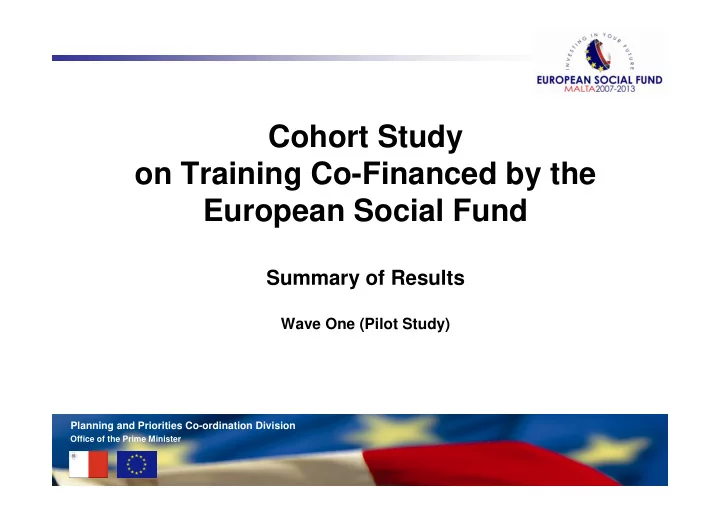

Cohort Study on Training Co-Financed by the European Social Fund Summary of Results Wave One (Pilot Study) Planning and Priorities Co-ordination Division Office of the Prime Minister
General Information • The first wave covered the period between 1 st February 2011 and 31 st July 2011 • A total of 6,197 persons were eligible to participate in the survey and these were distributed as shown in Tables 1 and 2 Planning and Priorities Co-ordination Division Office of the Prime Minister
General Information Table 1. Distribution of trainees by gender and age group Age Group Male Female 15-24 26.1% 32.1% 25-54 61.6% 59.8% 55-64 11.9% 7.7% 65 + 0.4 0.4 Planning and Priorities Co-ordination Division Office of the Prime Minister
General Information Table 2. Distribution of trainees by gender and district of residence District Male Female Malta 92% 88.4% Gozo 8.0% 11.6% • Amongst the respondents there were 5.92% persons with a disability, 0.79% migrants and 1.34% ‘other disadvantaged persons’ Planning and Priorities Co-ordination Division Office of the Prime Minister
Labour Status: Before And After Training • On average, 25% of all respondents felt that there was a change for the better Unemployed and Inactive Persons • 24.7% of the persons who were unemployed when they applied for training, were employed at the time when the survey was conducted • 87.7% of the inactive persons, had their employment status changed for the better once they received training Planning and Priorities Co-ordination Division Office of the Prime Minister
Labour Status: Before And After Training Gender • A slightly higher proportion of females stated that their employment status changed for the better Age • A higher percentage of persons falling within the 15 to 24 age bracket recorded a better change in their employment status Region • A slightly higher percentage of persons residing in Malta registered a better change in their employment status Planning and Priorities Co-ordination Division Office of the Prime Minister
Perceived Contribution of ESF Training: Short-term • Two out of every three persons stated that ESF contributed towards a change in their labour status Gender • 79.6% females and 62.2% males felt that ESF training was causative of a change in their status in the labour market Age • The largest percentage of persons who felt that ESF training contributed positively to a change in their labour status were persons aged between 15 to 24, which amounted to 84.3% Planning and Priorities Co-ordination Division Office of the Prime Minister
Perceived Contribution of ESF Training: Short-term • 40.8% felt that ESF contributed towards maintaining and/or enhancing the respondents’ employability • 16.9% of the disabled persons found ESF training as contributing towards the enhancement of their employability • Data shows an increase of 15.7% in employment amongst respondents, a decrease of 6.6% in unemployment and a 9.1% decrease in inactivity Planning and Priorities Co-ordination Division Office of the Prime Minister
Perceived Contribution of ESF Training: Long-term • 83.7% of respondents think that the training they gained through ESF will help them in the future Gender • This was particularly true for 91% females compared to 80.3% males Age • 90% of the younger participants (15 to 24 age bracket) think that ESF will help them in the future Planning and Priorities Co-ordination Division Office of the Prime Minister
Perceived Contribution of ESF Training: Long-term • Contribution of the training in the future is also recognised by 65.4% of vulnerable persons • 63.3% of those participants who think that ESF did not improve or enhance their current employment status think that the training would be relevant in the future Planning and Priorities Co-ordination Division Office of the Prime Minister
Thank you! Operational Programme II – Cohesion Policy 2007-2013 Empowering People for More Jobs and a Better Quality of Life Event part-financed by the European Union European Social Fund (ESF) Co-financing rate: 85% EU Funds; 15% National Funds Investing in your future Planning and Priorities Co-ordination Division Office of the Prime Minister
Recommend
More recommend